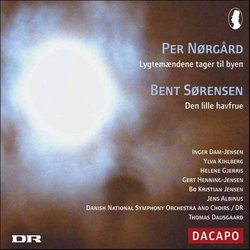| All Artists: Per Norgard, Bent Sorensen, Thomas Dausgaard, Helene Gjerris, Danish National Symphony Orchestra, Inger Dam-Jensen, Ylva Kihlberg, Gert Henning-Jensen, Bo Kristian Jensen Title: Per N�rg�rd: Lygtem�ndene tager til byen; Bent S�rensen: Den lille havfrue Members Wishing: 1 Total Copies: 0 Label: Marco Polo Original Release Date: 1/1/2006 Re-Release Date: 8/29/2006 Genre: Classical Style: Opera & Classical Vocal Number of Discs: 1 SwapaCD Credits: 1 UPC: 636943604625 |
Search - Per Norgard, Bent Sorensen, Thomas Dausgaard :: Per N�rg�rd: Lygtem�ndene tager til byen; Bent S�rensen: Den lille havfrue
 | Per Norgard, Bent Sorensen, Thomas Dausgaard Per N�rg�rd: Lygtem�ndene tager til byen; Bent S�rensen: Den lille havfrue Genre: Classical
|
Larger Image |
CD Details |
CD ReviewsNorgard's cantata has strong dramatic potential, but not muc Christopher Culver | 06/24/2007 (3 out of 5 stars) "In 2005, the bicentenary of the birth of Hans Christian Andersen was celebrated in Denmark, and the Danish National Symphony Orchestra/DR conducted by Thomas Dausgaard premiered two works based on Andersen's stories. Per Norgard's "The Will O' the Wisps Come to Town" is a dramatic fairytale cantata based on an eponymous story by Andersen, though the text of the songs were written in collaboration with Suzanne Brogger. It may be tempting to dismiss this as a minor work, light music directed at a young audience, but in fact this is Norgard's biggest work since "Terrains Vagues" four years earlier. Not only is it fairly long at half an hour, but it calls for massive forces. There's four vocal soloists, a chorus (Ars Nova Copenhagen), two choirs made up of young people (The Danish National Children's Choir/DR and The Danish National Juniors Choir/DR), the orchestra itself, and finally Sol og Mane (Sun & Moon), a percussion ensemble that grew out of Norgard's "infinity series" music for amateur musicians from 1970-1985. The work is recorded here with the original Danish text, and the booklet has a translation into English (an English version has also been toured, conducted by Rumon de Gamba). Much of the work consists of simple narration, charmingly recited by Jens Albinus. At dramatic passages, the chorus and children's choirs enter, and the opening and closing especially feature great orchestral contributions. The music at its most beautifully complex shows Norgard's interest in new uses of the infinity series, heard also in the 2002 harp concerto "Through Thorns" (on Da Capo's recent Works for Harp CD), and presumably a major concern of his seventh symphony, completed last year but not yet premiered. With this recent style, melodies seem to continually bloom out of each other, creating a constant flow of new sounds that are nonetheless linked by the unheard infinity series underlying them. Unfortunately, while the new music is good, there's very little of it. Narration takes up such a large part of the work, and the writing for children's choir is fairly mundane for Norgard. Only the opening and closing offers any exciting, and frankly, I find the contribution by Sun and Moon, which I was eagerly awaiting, to be inaudible. There's undoubtedly strong dramatic power in this cantata, and I'm sure seeing it live would be a blast, but this disc is frustrating. Nonetheless, if you've already heard the usual introductions to Norgard's works--and this is definitely not one of them, try the symphonies instead--and want to see where he's going next, this gives a glimpse. Bent Sorensen's "The Little Mermaid" for soprano, tenor, girls' choir and orchestra (2005) divides the depiction of the fairytale into three movements, "Storm", "The Stillness" and "The Celebration". The libretto is by Peter Asmussen, who edited Andersen's own words down to a short of poem recounting the story more briefly. The tenor also sings entries from the dying Andersen's own diary, a rather out-of-place affair that at least won't bother listeners who don't speak Danish. Most of the work is the poignant, somehow decayed Romanticism that is Sorensen's unique style. However, there are elements here I had not encountered previously in his music, such as the eerie sense of stasis in the second movement, or the harsh dissonances on brass and strings that open the final movement. This is a lovely work, and though Sorensen is not among my favourite composers, I enjoy this greatly." Explore, imagine, experience, self-interpret Dynamo Hum | San Jose, CA USA | 08/15/2009 (5 out of 5 stars) "What reviewer Culver apparently neglects to consider sufficiently is the musical value of the human voice, especially as utilized creatively here by Norgard. Acoustical spaces and sparseness feature prominently in this storied work. And while the non-vocal music mostly plays a secondary or supporting role, it does so supremely and sublimely (as in Scene 2, for example). When one listens to Norgard with an open heart one embarks willingly on a sonic journey of invention devoid of preconceptions and intellectual bias. Turn off your cell phone, your pager, your frenetic social self. Take the anonymous plunge and be rewarded."
|

 Track Listings (15) - Disc #1
Track Listings (15) - Disc #1